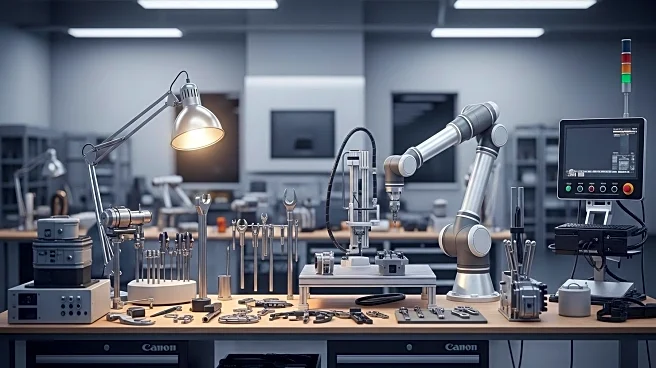What's Happening?
Blue-collar businesses across the United States are increasingly integrating artificial intelligence (AI) tools to enhance productivity and streamline operations. Companies like Oak Creek Plumbing & Remodeling in Milwaukee are utilizing AI software such as ChatGPT to automate administrative tasks, including invoice creation and troubleshooting complex plumbing issues. This adoption of AI is not limited to plumbing; tradespeople in various sectors are using platforms like ServiceTitan and Housecall Pro to improve efficiency. A survey by Housecall Pro revealed that over 70% of tradespeople have experimented with AI tools, with 40% actively using them. The integration of AI is reshaping the way these businesses operate, allowing them to take on more projects and improve service quality.
Why It's Important?
The adoption of AI in blue-collar industries is significant as it represents a shift towards more technologically advanced operations, potentially leading to increased revenue and reduced overhead costs. For instance, Gulfshore Air Conditioning & Heating in Florida reported a $370,000 revenue increase within 30 days of implementing AI marketing features. This trend suggests that AI can help businesses in the trades sector become more competitive by automating routine tasks and freeing up workers to focus on more complex, hands-on activities. As AI tools become more prevalent, they may reduce the need for administrative roles, impacting employment patterns in these industries. However, AI is currently seen as a tool to enhance rather than replace the jobs of technicians.
What's Next?
As AI continues to be integrated into blue-collar businesses, companies may explore further automation opportunities, potentially leading to new compensation models for workers. Gulfshore Air Conditioning & Heating plans to roll out new compensation packages for technicians within the next six months, reflecting the increased revenue generated by AI tools. Additionally, vocational schools are incorporating AI into their curricula to prepare students for future job markets. While there is some hesitancy among tradespeople regarding AI's application to physical tasks, the technology's benefits are becoming increasingly apparent, suggesting continued growth in its adoption.
Beyond the Headlines
The integration of AI in blue-collar industries raises questions about the future of employment and the skills required in these sectors. As AI tools automate administrative tasks, workers may need to adapt by developing new skills that complement AI technology. This shift could lead to a reevaluation of educational programs and training initiatives to ensure workers are equipped for evolving job demands. Furthermore, the ethical implications of AI in the workplace, such as data privacy and the potential for job displacement, will need to be addressed as the technology becomes more widespread.










